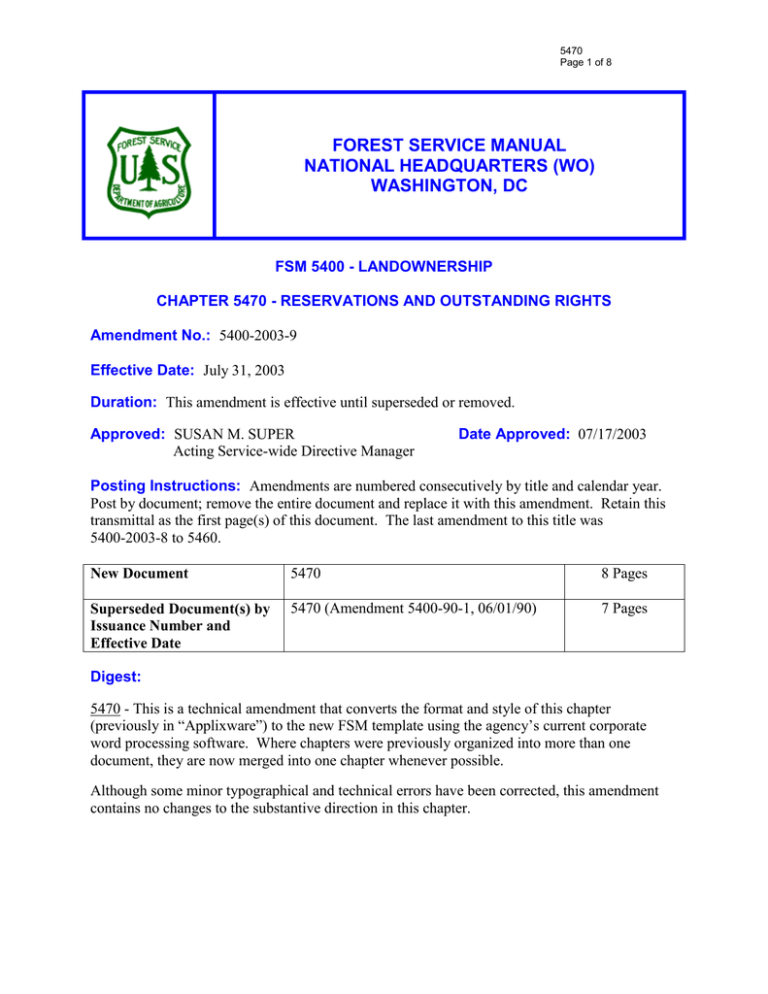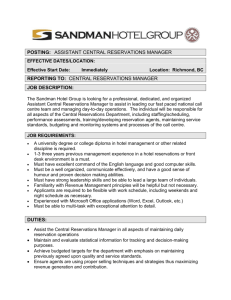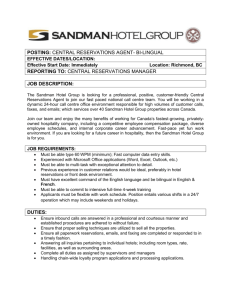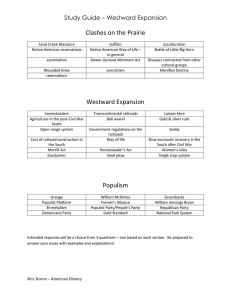
5470
Page 1 of 8
FOREST SERVICE MANUAL
NATIONAL HEADQUARTERS (WO)
WASHINGTON, DC
FSM 5400 - LANDOWNERSHIP
CHAPTER 5470 - RESERVATIONS AND OUTSTANDING RIGHTS
Amendment No.: 5400-2003-9
Effective Date: July 31, 2003
Duration: This amendment is effective until superseded or removed.
Approved: SUSAN M. SUPER
Acting Service-wide Directive Manager
Date Approved: 07/17/2003
Posting Instructions: Amendments are numbered consecutively by title and calendar year.
Post by document; remove the entire document and replace it with this amendment. Retain this
transmittal as the first page(s) of this document. The last amendment to this title was
5400-2003-8 to 5460.
New Document
5470
8 Pages
Superseded Document(s) by
Issuance Number and
Effective Date
5470 (Amendment 5400-90-1, 06/01/90)
7 Pages
Digest:
5470 - This is a technical amendment that converts the format and style of this chapter
(previously in “Applixware”) to the new FSM template using the agency’s current corporate
word processing software. Where chapters were previously organized into more than one
document, they are now merged into one chapter whenever possible.
Although some minor typographical and technical errors have been corrected, this amendment
contains no changes to the substantive direction in this chapter.
WO AMENDMENT 5400-2003-9
EFFECTIVE DATE: 07/31/2003
DURATION: This amendment is effective until superseded or removed.
5470
Page 2 of 8
FSM 5400 - LANDOWNERSHIP
CHAPTER 5470 - RESERVATIONS AND OUTSTANDING RIGHTS
Table of Contents
5470.1 - Authority....................................................................................................................... 3
5470.11 - Statutory Authority ................................................................................................. 3
5470.11a - Reservations by Non-Federal Owners .................................................................. 3
5470.11b - Reservations by the United States ........................................................................ 4
5470.11c - Regulations ........................................................................................................... 6
5470.2 - Objectives ..................................................................................................................... 6
5470.3 - Policy ............................................................................................................................ 6
5470.4 - Responsibility ............................................................................................................... 6
5471 - RESERVATIONS IN CONVEYANCES TO THE UNITED STATES .................... 7
5472 - OUTSTANDING RIGHTS .................................................................................... 7
5473 - RESERVATIONS BY THE UNITED STATES ..................................................... 7
5474 - DEED RESTRICTIONS AND CONDITIONS ....................................................... 8
5475 - VALUATION OF RESERVATIONS AND OUTSTANDING RIGHTS ................... 8
5476 - CONDEMNATION OF OUTSTANDING RIGHTS ................................................ 8
WO AMENDMENT 5400-2003-9
EFFECTIVE DATE: 07/31/2003
DURATION: This amendment is effective until superseded or removed.
5470
Page 3 of 8
FSM 5400 - LANDOWNERSHIP
CHAPTER 5470 - RESERVATIONS AND OUTSTANDING RIGHTS
5470.1 - Authority
5470.11 - Statutory Authority
Numerous acts of Congress provide authority to acquire and dispose of National Forest System
land or interests in land. Some acts include specific guidelines for reservations and outstanding
rights. These are listed below. Other acquisition authorities do not mention reservations and
outstanding rights but provide authority for the acquisition of land, or land and interests in land,
or land and water interests therein. Carefully review against the statutory authority any
landownership adjustment proposal subject to outstanding or reserved rights to ensure that the
proposal is consistent with the guidelines in the act. When the act contains no restrictions,
acquisition subject to reservations and outstanding rights are authorized, consistent with the
policies and guidelines of this chapter. Acquisition authorities are in FSM 1010, FSM 5420.1,
and FSM 5430.1.
5470.11a - Reservations by Non-Federal Owners
1. Weeks Act of March 1, 1911. (36 Stat. 961, as amended, 16 U.S.C. 480, 500,
513-517, 517a, 518, 519, 551, 563, as amended). This law permits the purchase or exchange of
lands encumbered by located or defined rights-of-way, easements, and reservations that would
not interfere with use of the lands for purposes of the act. The act provides that rights-of-way,
easements, and reservations retained by the grantor be subject to rules and regulations of the
Secretary of Agriculture (FSM 1013.4, 36 CFR 251.14 - 251.19). The Federal Land Policy and
Management Act of October 21, 1976 (90 Stat. 2743; 43 U.S.C. 1715, 1716) amends the Weeks
Act by authorizing the Secretary to accept title to any non-Federal land or interest therein.
2. General Exchange Act of March 20, 1922. (42 Stat. 465, as amended; 74 Stat. 205;
16 U.S.C. 485, 486, 7 U.S.C. 2201). This law permits acquisition of lands by exchange,
encumbered by reservations of timber, or minerals or easements that would not interfere with use
of the lands for National Forest purposes. The act is amended by the Federal Land Policy and
Management Act of October 21, 1976 (90 Stat. 2743; 43 U.S.C. 1715, 1716), which authorizes
the Secretary to accept title to any non-Federal land or interest therein.
3. Clarke-McNary Act of June 7, 1924. (43 Stat. 653, as amended, 16 U.S.C. 596). This
law permits acceptance of donated lands subject to reservation of merchantable timber or mineral
or other rights for a period not exceeding 20 years.
4. Department of Agriculture Organic Act of August 3, 1956. (70 Stat. 1034; 7 U.S.C.
428a(a)). This law provides for the acquisition of land or interests in land by purchase,
exchange, or otherwise as may be necessary to carry out the authorized work of the Department.
WO AMENDMENT 5400-2003-9
EFFECTIVE DATE: 07/31/2003
DURATION: This amendment is effective until superseded or removed.
5470
Page 4 of 8
FSM 5400 - LANDOWNERSHIP
CHAPTER 5470 - RESERVATIONS AND OUTSTANDING RIGHTS
5. Act of March 3, 1925. (43 Stat. 1133, as amended, 16 U.S.C. 555). This law permits
acquisition of sites for Forest Headquarters, Ranger stations, and dwellings by purchase or
donation subject to reservations or outstanding rights as the Secretary of Agriculture determines
would not interfere with the purpose of the act. The purpose of this act is to provide sites needed
for the effective conduct of authorized activities of the Forest Service.
6. Whiskeytown-Shasta-Trinity National Recreation Area Act of November 8, 1965.
(79 Stat. 1295; 16 U.S.C. 460q). This law authorizes grantors to reserve all or any part of the
minerals or any other interest or right of use in such lands or waters on such terms and
conditions, as the Secretary may deem appropriate.
7. Wild and Scenic Rivers Act of October 2, 1968. (82 Stat. 906 as amended; 16 U.S.C.
1271-1287). This law authorizes the acquisition of land or interests in land and permits the
owners of improved property (as defined in the act), on the date of its acquisition, to retain for
themselves and their successors or assigns a right of use and occupancy of the improved property
for noncommercial residential purposes for a definite term not to exceed 25 years or for the
lifetime of the owner or spouse.
8. Oregon Dunes National Recreation Area Act of March 23, 1972. (86 Stat. 99;
16 U.S.C. 460z). This law provides persons or their assigns owning improved property with a
right to reserve use and to occupy the residence and no more than 3 acres of land on which such
residence is situated for the life-time of the owners or for a period not to exceed 25 years. The
Secretary may exclude from such reserved property any lands or waters deemed necessary for
public use, access, or development.
9. Eastern Wilderness Act of January 3, 1975. (88 Stat. 2096; 16 U.S.C. 1131, 1132).
This law authorizes property owners to retain for themselves, their successors, or assigns a right
to use and occupy the property for noncommercial residential purposes or for agricultural
activities for 25 years or until the death of the owner or spouse, whichever occurs later.
10. Federal Land Policy and Management Act of October 21, 1976. (90 Stat. 2743;
43 U.S.C. 1715, 1716). This law amends all exchange authorities and authorizes the Secretary to
accept title to any non-Federal land or interest therein determined to be in the public interest.
5470.11b - Reservations by the United States
The laws authorizing disposal of National Forest System land provide a variety of guidelines for
reservations by the United States. References to reservations contained in the principal land
exchange and sale authorities are outlined below. The numerous special sale and exchange acts
(FSM 5430 and FSM 5450) generally represent special purpose legislation and are not discussed
in this section.
WO AMENDMENT 5400-2003-9
EFFECTIVE DATE: 07/31/2003
DURATION: This amendment is effective until superseded or removed.
5470
Page 5 of 8
FSM 5400 - LANDOWNERSHIP
CHAPTER 5470 - RESERVATIONS AND OUTSTANDING RIGHTS
1. Federal Land Policy and Management Act of October 21, 1976. (90 Stat. 2743;
43 U.S.C. 1715, 1716). This law amends all exchange authorities by authorizing the Secretary to
dispose of a tract of land or interests therein where the Secretary determines that such disposal
would serve the public interest.
2. General Exchange Act of March 20, 1922. (42 Stat. 465, as amended, 16 U.S.C. 485,
486). This law provides that either party to an exchange may reserve timber, minerals, or
easements.
3. Weeks Law Exchange Act of March 3, 1925. (43 Stat. 1215; 16 U.S.C. 516). This
law does not restrict reservations in conveyances from the United States. The United States may
make such reservations as are in the public interest.
4. Title III, Bankhead-Jones Farm Tenant Act of July 22, 1937. (50 Stat. 525, as
amended; 7 U.S.C. 1010-1012). This law provides that title III lands may be exchanged subject
to such reservations or conditions as are deemed necessary and in the public interest and subject
to existing outstanding rights.
This law also requires that the conveyance of lands to public agencies by sale or grant be subject
to the condition that such land is to be used for public purposes.
5. Department of Agriculture Organic Act of August 3, 1956. (70 Stat. 1034; 7 U.S.C.
428a(a)). This law provides for the acquisition of land or interests in land by purchase,
exchange, or otherwise as may be necessary to carry out the authorized work of the Department.
There are no restrictions on conveyances from the United States.
6. Forest Service Omnibus Act of October 23, 1962. (76 Stat. 1157; 16 U.S.C. 555a).
This law contains no restrictions prohibiting either party from making reservations. The United
States may make such reservations as are in the public interest.
7. Townsite Act of July 31, 1958. (72 Stat. 438, as amended; 16 U.S.C. 478a). The
purpose of this law is to convey lands determined to be essential for community needs in the 11
contiguous western states. It does not restrict reservations in conveyances from the United
States. The United States may make such reservations as are in the public interest.
8. Small Tracts Act of January 22, 1983. (96 Stat. 2535; 16 U.S.C. 521c-521i). This law
allows the conveyance of lands to resolve land disputes and management problems involving
encroachments, mineral survey fractions, and certain road rights-of-way. It does not restrict
reservations in conveyances from the United States. The United States may make such
reservations as are in the public interest.
WO AMENDMENT 5400-2003-9
EFFECTIVE DATE: 07/31/2003
DURATION: This amendment is effective until superseded or removed.
5470
Page 6 of 8
FSM 5400 - LANDOWNERSHIP
CHAPTER 5470 - RESERVATIONS AND OUTSTANDING RIGHTS
5470.11c - Regulations
The Secretary of Agriculture's rules and regulations governing the exercise of rights reserved by
grantors are in 36 CFR 251.14-251.19 (FSM 1013.4). Check for preprinted regulation forms
and, where available, use them in negotiations and as attachments to options and land exchange
agreements.
See FSM 2830 for information about the various rules and regulations governing the exercise of
reserved mineral rights.
5470.2 - Objectives
To accomplish real property adjustments free of encumbrances that would detract from present
or future uses of National Forest System land or that would needlessly restrict private land use
and impose an unwarranted management obligation on the Forest Service.
5470.3 - Policy
Acquire and dispose of land with as few reservations and outstanding rights as possible. Make
exceptions to this policy when it is possible to satisfy management needs by acquiring only a
partial interest or when it is necessary to impose reservations or conditions to ensure proper land
management--such as when the best access to other lands is across the tract being conveyed.
However, keep encumbrances to a minimum and ensure that they are compatible with National
Forest System purposes. Because separate ownership of the surface and mineral estates can have
an adverse affect upon land management objectives, place particular emphasis on keeping these
two estates together.
Carefully administer the exercise of reserved rights to ensure compliance with the terms of the
reservation and protection of the public interest.
All rights reserved by the vendor, either for that vendor or for the use of another, must be subject
to the applicable rules and regulations of the Secretary of Agriculture and to any other conditions
necessary to protect the public interest.
Make reservations as specific as possible; specify an expiration date and confine the reserved
right to the minimum area needed.
5470.4 - Responsibility
The Forest Supervisor assesses the impact of proposed reservations or outstanding rights on use
of land for National Forest System purposes and makes recommendations for acquisition or
disposal.
WO AMENDMENT 5400-2003-9
EFFECTIVE DATE: 07/31/2003
DURATION: This amendment is effective until superseded or removed.
5470
Page 7 of 8
FSM 5400 - LANDOWNERSHIP
CHAPTER 5470 - RESERVATIONS AND OUTSTANDING RIGHTS
5471 - RESERVATIONS IN CONVEYANCES TO THE UNITED STATES
A number of different kinds of reservations are possible in real estate transactions. The most
common reservations are minerals, timber, occupancy, water, grazing, improvements or use of
improvements, easement, and right-of-way reservations. See FSH 5409.13 for a thorough
discussion of the use of reservations.
5472 - OUTSTANDING RIGHTS
Outstanding rights are the same types as those discussed under reservations (FSM 5471).
However, rather than being reserved by the grantor in a conveyance to the United States, these
rights are owned by a third party by virtue of a previous reservation or deed of conveyance.
Identify outstanding rights by reference to the document creating the right.
Encourage the present owner to acquire outstanding rights that are potentially incompatible with
planned projects or use before conveying property to the Government. If this is not possible and
the outstanding rights are potentially incompatible with planned projects or use, the Forest
Supervisor shall attempt to acquire these rights or to obtain agreement from the owner of the
rights to subject the exercise and use of the rights to the Secretary's rules and regulations. The
remaining alternative is to weigh the possible adverse impacts of the outstanding rights on
planned use of the land. The decision whether or not to acquire property subject to the
outstanding rights must take place at the level having case approval authority. For all
outstanding rights, document with Form FS-5400-29, Certificate of Use and Consent for
Purchase, Donation, and Land Exchange. If it is necessary to acquire the land and if the
outstanding rights are incompatible with planned projects or use, consider condemnation of the
out standing right.
5473 - RESERVATIONS BY THE UNITED STATES
In all disposals of National Forest System land or interests in land, it is essential to reserve those
interests and rights-of-way necessary to comply with laws and regulations, to permit removal of
reserved resources, to protect interests reserved in such documents as conservation easements,
and to provide access to National Forest System lands (FSM 5470.11b).
Include in all conveyances of National Forest System land appropriate reservations or conditions
that are necessary to effectively manage and administer National Forest System lands and
resources. Reservations may occasionally be used as a means of ensuring that all parties affected
by a land exchange receive equitable treatment.
Reserve a right-of-way for ditches or canals constructed by the authority of the United States in
all patents for land after August 30, 1890, under any of the land laws of the United States, or on
entries or claims validated by the Act of August 30, 1890, west of the 100th meridian.
WO AMENDMENT 5400-2003-9
EFFECTIVE DATE: 07/31/2003
DURATION: This amendment is effective until superseded or removed.
5470
Page 8 of 8
FSM 5400 - LANDOWNERSHIP
CHAPTER 5470 - RESERVATIONS AND OUTSTANDING RIGHTS
Do not exchange lands of the United States under the authority of the General Exchange Act of
March 20, 1922, as amended, and certain other exchange acts without reserving minerals, unless
the Secretary of the Interior advises that the lands are nonmineral in character or approves the
value and disposal of the minerals in the lands to be patented.
5474 - DEED RESTRICTIONS AND CONDITIONS
In conveyances of National Forest System lands, in addition to reservations, it may be necessary
to apply specific limiting conditions to manage effectively or to protect National Forest System
lands and resources. Likewise, lands may occasionally be acquired with limiting conditions such
as restrictive covenants. For additional information, see the definitions in FSH 5409.13.
5475 - VALUATION OF RESERVATIONS AND OUTSTANDING RIGHTS
In most instances, reservations and outstanding rights have an effect on the value of the property
being conveyed. Know the effect on value plus the administrative impacts prior to negotiation.
Include the effect on value in the appraisal to determine fair market value.
See FSM 5410 for the guidelines for appraising properties subject to reserved or outstanding
rights.
5476 - CONDEMNATION OF OUTSTANDING RIGHTS
There are three circumstances that may require condemnation of outstanding rights.
1. Protection of the Public Interest. When the exercise of the right would cause
unacceptable damage to the environment, would materially interfere with National Forest System
programs, or would result in public hazards.
2. Subordination. To subordinate rights when some control is needed but it is not
necessary to acquire title to the right. Use subordination only in exceptional cases because courts
generally award damages as though the total property were acquired.
3. Quiet Title Actions. When it is not possible to determine the owner of all or a portion
of the real property ownership rights.





